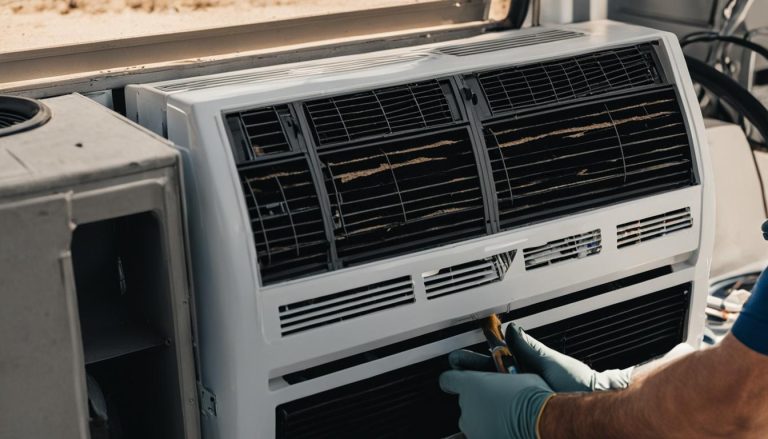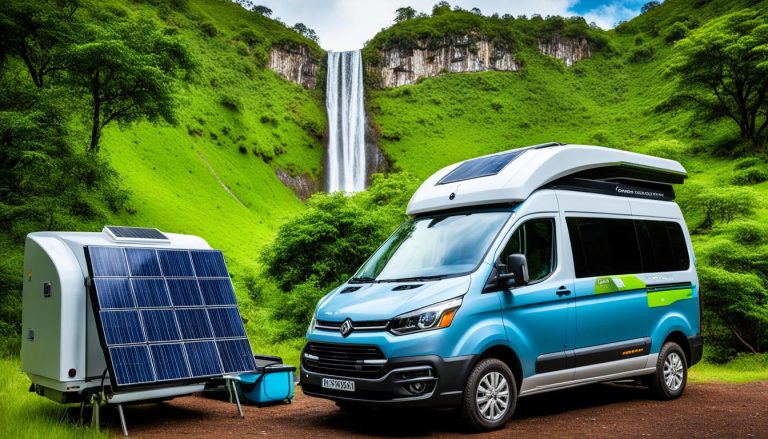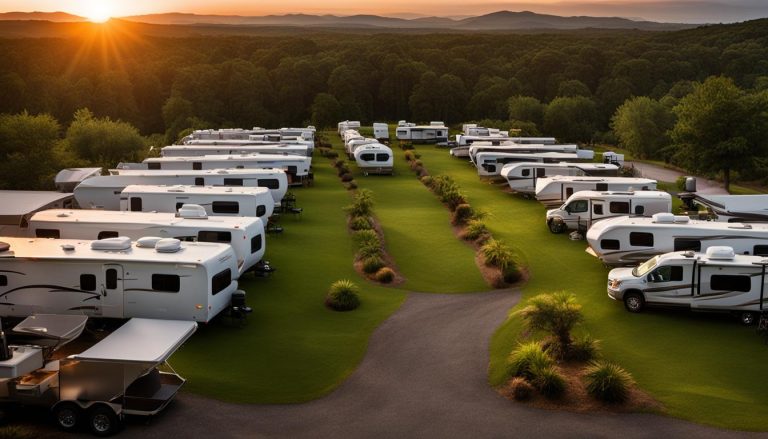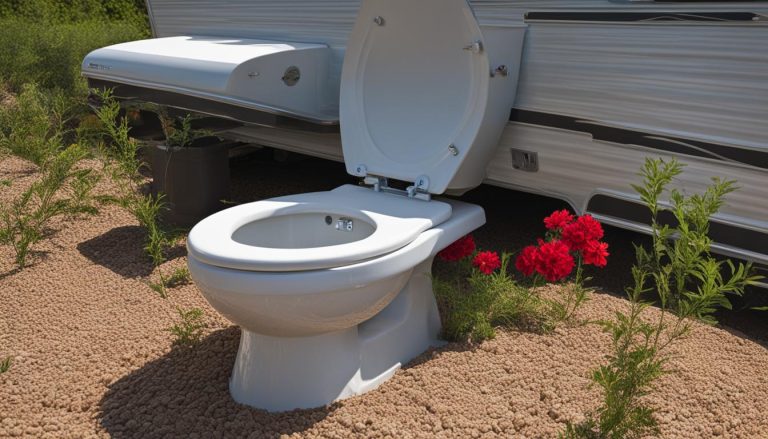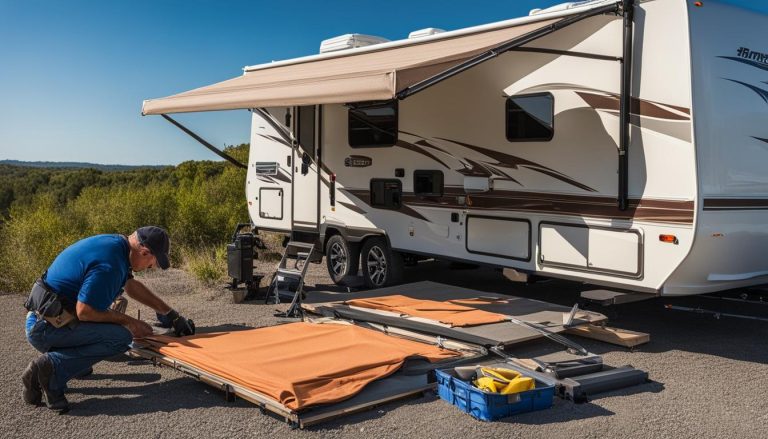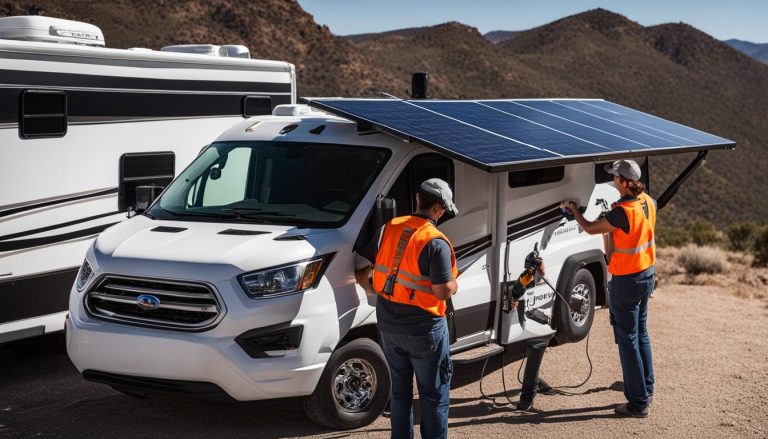Safe RV Storage Solutions: Where to Store Your RV
gorvlifestyle.com and its partners may earn a commission if you purchase a product through one of our links
When the winter season approaches, it’s important to find a safe and secure place to store your RV. Proper storage not only protects your investment but also ensures that your vehicle is ready for your next adventure. Whether you’re looking for affordable options or the best secure RV storage facilities, we’ve got you covered. Read on to discover the different RV storage options available and find the one that suits your needs.
Key Takeaways:
- Choose a secure RV storage solution to protect your vehicle during the winter.
- Consider covered facilities or exterior RV covers for optimal weather protection.
- Take precautions to keep insects away by sealing vents and openings.
- Remove perishable items from your RV and open up cabinets for increased airflow.
- Cover your RV furniture to prevent dust and animal damage.
Store Your RV in a Covered Facility
When it comes to storing your RV during the winter season, opting for a covered facility provides the best protection against weather damage. A covered facility shields your RV from freezing temperatures, rain, snow, and excessive sun exposure, ensuring its condition remains intact.
It is highly recommended to choose a storage facility that offers climate-controlled options. Climate-controlled facilities regulate the interior temperature, preventing extreme heat or cold from affecting your RV. This controlled environment helps safeguard sensitive components and prevents issues such as mold growth, rust, and interior damage.
By storing your RV in a covered and climate-controlled facility, you can have peace of mind knowing that it is in a safe and optimal environment. Whether it’s for a short period or the entire winter season, your RV will be shielded from the elements and ready for your next adventure.
“Storing your RV in a covered facility, preferably a climate-controlled one, is the best way to protect it from weather damage during the winter.” – John Thompson, RV Enthusiast
Use an Exterior RV Cover if a Storage Facility is Not Available
If you cannot find a storage facility with covered options, using an exterior RV cover is a good alternative. While not as effective as covered storage, an RV cover helps protect your vehicle from the elements, including UV rays, rain, and snow. It is important to choose a high-quality RV cover that fits properly and provides adequate protection.
An exterior RV cover acts as a barrier between your RV and outdoor conditions, preventing damage and extending its lifespan. Here are some key benefits of using an RV cover:
- Protection from UV rays: Sun exposure can cause fading and deterioration of your RV’s exterior paint, decals, and seals. An RV cover shields your vehicle from harmful UV rays, preserving its appearance and value.
- Rain and snow protection: RV covers are designed to be water-resistant or waterproof, providing a barrier against rainwater and snow accumulation. This helps prevent moisture damage, such as mold, mildew, and rot.
- Shielding from dirt and debris: By keeping your RV covered, you can avoid the buildup of dirt, dust, leaves, bird droppings, and other debris. This reduces the need for frequent cleaning and minimizes the risk of scratches or stains.
When selecting an exterior RV cover, consider the following factors:
- Size: Choose a cover specifically designed to fit your RV’s dimensions. An ideal cover should provide a snug fit without being too tight or loose.
- Material: Look for covers made from durable and breathable materials, such as polyester or polypropylene. These materials offer resistance to UV rays and are less likely to trap moisture, preventing mold and mildew growth.
- Features: Some RV covers come with additional features, such as zippered access panels, reinforced corners, and adjustable straps. These features enhance ease of use and provide a more secure fit.
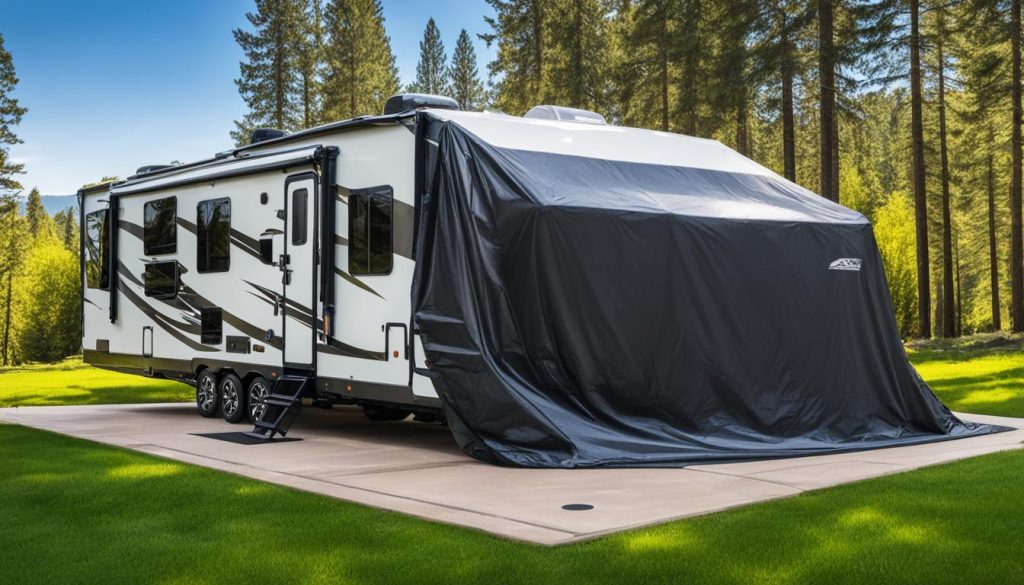
Investing in an exterior RV cover is a cost-effective way to protect and preserve your vehicle when a covered storage facility is not available. Remember to properly secure the cover to prevent it from flapping in the wind, which could cause damage to your RV’s exterior. With the right cover, you can enjoy peace of mind knowing that your RV is safeguarded from the elements during outdoor storage.
<!–
| RV Cover Type | Pros | Cons |
|---|---|---|
| Custom-Fit Covers | Provides the best fit and maximum protection. | Higher cost compared to universal-fit covers. |
| Universal-Fit Covers | Available in various sizes and more affordable. | May not provide a perfect fit for certain RV models. |
| Hi-Loft Covers | Ideal for regions with heavy snowfall. | Can be bulkier and slightly more expensive. |
–>
Take Precautions to Keep Insects Away
Preventing insects from entering your RV during storage is essential to avoid infestations and damage. One common entry point for insects is through RV vents, so it’s crucial to ensure they are properly covered and sealed.
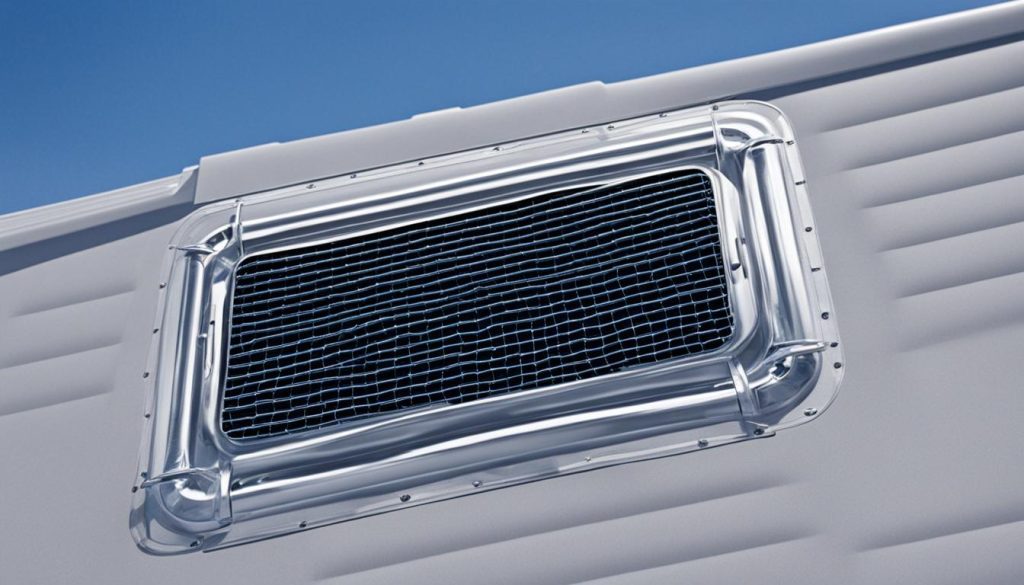
Covering RV vents with mesh screens is an effective way to keep out insects while allowing airflow. Make sure the screens are securely attached to prevent bugs from crawling through any gaps. You can find RV vent covers with built-in mesh screens that provide an extra layer of protection.
In addition to vents, carefully inspect your RV for any other openings or gaps where insects could access. Common entry points include gaps around windows, doors, and utility connections. Seal these areas using caulk or weatherstripping to create a barrier against pests.
Regularly check the effectiveness of your insect prevention measures during the storage period. Inspect the vents and other sealed areas to ensure they remain intact and free from any signs of insect activity. If you notice any issues, promptly repair or replace the necessary components.
Remove Perishables and Open Up Cabinets
Before storing your RV for the winter, it is important to take certain steps to ensure its cleanliness and freshness when you’re ready to hit the road again. One essential task is to remove all perishable items from your RV pantry and cabinets. This helps prevent food decay and any unwanted odors that may arise during the off-season. Dispose of any food items that have a shorter shelf life and are likely to spoil over time. By clearing out your pantry, you’ll avoid coming back to unpleasant surprises and minimize the likelihood of attracting pests.
But it’s not just food you need to consider. Cold weather can also affect other items stored in your RV, such as blankets and pillows. To protect these items from potential damage, remove them from your RV before winter storage.
Now, let’s talk about mold and odors. Keeping your RV cabinets well-ventilated is crucial in preventing the growth of mold and controlling odors that may develop during the winter months. Opening up your cabinet doors allows for increased airflow, reducing the chances of mold and mildew growth. It’s a simple step but can make a big difference when it comes to maintaining a fresh and clean RV interior.
Benefits of Increased Airflow in RV Cabinets
- Reduces moisture buildup and prevents mold growth
- Helps control odors and keeps the interior smelling fresh
- Improves overall air quality inside the RV
- Prevents the accumulation of unpleasant odors and musty smells
So, before you store your RV for the winter, be sure to remove all perishable items, clear out your cabinets, and open up those cabinet doors to promote increased airflow. With these simple steps, you’ll be one step closer to a clean, fresh-smelling RV when spring arrives.
Cover Your RV Furniture
To keep your RV furniture in good condition, it’s important to take steps to protect it. One effective way to do this is by using high-quality RV furniture covers. These covers serve multiple purposes, preventing dust, dirt, and other particles from settling into the upholstery, and they can also help deter unwanted animals from damaging your furniture.
RV furniture covers are designed to fit snugly over your furniture, providing a protective barrier. They are typically made from durable materials that are resistant to moisture and stains. By using these covers, you can maintain the appearance and functionality of your RV’s interior, ensuring that your furniture stays clean and comfortable.
Not only do RV furniture covers protect against dust and dirt, but they also prevent animal damage. Unwanted visitors, such as mice and raccoons, can be attracted to your RV and cause significant damage to your furniture if left unprotected. By covering your furniture, you create an additional barrier that helps deter animals from accessing and damaging your beloved RV furnishings.
Benefits of Using RV Furniture Covers:
- Prevent dust, dirt, and other particles from settling into the upholstery
- Deter unwanted animals, such as mice and raccoons, from damaging your furniture
- Maintain the appearance and functionality of your RV’s interior
- Extend the lifespan of your furniture
Investing in high-quality RV furniture covers is a wise decision to protect your valuable investment. When choosing covers, look for ones specifically designed for RV furniture and ensure they fit properly. This will provide optimal protection and peace of mind, knowing that your furniture is shielded from dust, dirt, and potential animal damage.
| Benefits of RV Furniture Covers | Effective Dust Prevention | Animal Damage Prevention |
|---|---|---|
| Prevent dust, dirt, and other particles from settling into the upholstery | ✓ | ✓ |
| Deter unwanted animals from damaging your furniture | – | ✓ |
| Maintain the appearance and functionality of your RV’s interior | – | ✓ |
| Extend the lifespan of your furniture | – | ✓ |
Properly Prepare Your Fridge, Freezer, and Plumbing System
When preparing your RV for winter storage, it’s crucial to properly prepare your fridge, freezer, and plumbing system. Taking these steps will ensure that your appliances and plumbing remain in good condition and prevent any potential damage.
RV Fridge and Freezer Preparation
Before storing your RV, follow these steps to prepare your fridge and freezer:
- Remove all perishable items from the fridge and freezer compartments.
- Allow the fridge and freezer to defrost completely.
- Clean the interior of the fridge and freezer with a non-toxic all-purpose cleaner.
- Leave the doors of the fridge and freezer open throughout the winter storage period.
By removing perishable items, defrosting, and cleaning the interior, you can prevent any food decay, unpleasant odors, and potential damage to your RV fridge and freezer. Leaving the doors open will promote airflow and prevent any musty smells from developing.
Plumbing System Winterization
Properly winterizing your RV’s plumbing system is essential to prevent freezing and potential damage. Follow these steps to winterize your plumbing system:
- Drain all fluids from the plumbing system, including the fresh water, gray water, and black water tanks.
- Add antifreeze to the plumbing system to prevent any remaining water from freezing.
- Flush the toilets and run the faucets to ensure the antifreeze is distributed throughout the system.
- Close all valves and securely seal any openings to prevent the entry of pests or air leaks.
By draining the fluids and adding antifreeze, you can protect your RV’s plumbing system from freezing temperatures. This will help prevent costly repairs and ensure that your plumbing system is in good working condition when you’re ready to use your RV again.
Winterization Checklist
| Steps | Fridge and Freezer Preparation | Plumbing System Winterization |
|---|---|---|
| 1 | Remove perishable items | Drain all fluids from the plumbing system |
| 2 | Allow defrosting | Add antifreeze to prevent freezing |
| 3 | Clean interior with non-toxic cleaner | Flush toilets and run faucets |
| 4 | Leave fridge and freezer doors open | Close valves and seal openings |
Following these steps will help ensure that your RV’s fridge, freezer, and plumbing system are properly prepared for winter storage. Taking the necessary precautions will safeguard your appliances and plumbing, allowing you to enjoy your RV worry-free when the camping season resumes.
Other Important Considerations for RV Storage
In addition to the previous steps, there are a few more important considerations for RV storage. Maintaining your RV tires is crucial to ensure safe and smooth travels. Regularly clean your tires and avoid exposing them to direct sunlight, as UV rays can cause damage over time. To prevent uneven wear, consider using leveling blocks to distribute pressure evenly on the tires.
Another essential step is removing the battery from your RV. Storing it separately in a cool and dry place helps prolong its lifespan and prevents any potential damage. Additionally, adding a fuel stabilizer to your RV’s fuel tank is recommended. This will keep the fuel in good condition and prevent any degradation that may occur during the winter.
Prior to storing your RV for the off-season, it is crucial to change the oil in the engine. This preventive measure helps safeguard the engine by preventing oil degradation and ensuring its optimal performance when you are ready to hit the road again. If you are unable to store your RV on your own property, consider renting a space at a reputable RV storage facility. These facilities offer secure storage solutions that provide peace of mind knowing your RV is protected.
FAQ
How important is it to store an RV properly during the winter season?
Storing an RV properly during the winter season is essential to ensure its safety and protect it from the elements.
What are the available options for RV storage?
There are various storage options available, including covered facilities, exterior RV covers, and self-storage facilities.
What is the best way to protect an RV from weather damage during the winter?
Storing your RV in a covered facility, preferably a climate-controlled one, is the best way to protect it from weather damage during the winter.
What if I can’t find a covered storage facility?
If you cannot find a storage facility with covered options, using an exterior RV cover is a good alternative.
How can I prevent insects from entering my RV during storage?
Preventing insects from entering your RV during storage is essential to avoid infestations and damage. Cover all vents that insects could crawl into and ensure they are closed properly.
What should I do before storing my RV for the winter?
Before storing your RV for the winter, remove all perishable items from your pantry and cabinets. Dispose of any food items that may spoil during the off-season.
How can I keep my RV furniture in good condition during storage?
To keep your RV furniture in good condition, cover it with high-quality RV furniture covers. This will help prevent dust, dirt, and other particles from settling into the upholstery.
How should I prepare my fridge, freezer, and plumbing system before storing my RV?
Before storing your RV, properly prepare your fridge and freezer by removing all perishable items and allowing them to defrost completely. Clean the interior with a non-toxic all-purpose cleaner and leave the doors open throughout the winter.
Are there any other important considerations for RV storage?
In addition to the previous steps, there are a few more important considerations for RV storage. Keep your tires in good shape by cleaning them and avoiding direct sunlight. Remove the battery from your RV and store it separately to prolong its lifespan. Add a fuel stabilizer to your fuel to keep it in good condition during the winter. Lastly, change the oil in your RV’s engine before storing it to prevent oil degradation.
What should I do if I can’t store my RV on my own property?
If you are unable to store your RV on your own property, consider renting a storage space at a reputable RV storage facility that offers the amenities and security you require.

